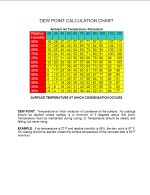If this is air conditioned space, that would really help prevent mildew and mold.[/QUOTE
Dave1949...please clarify...are you stating that air conditioning will help prevent mildew and mold, or will the insulation help prevent mildew and mold? For what it may be worth, the space I described in my earlier post DOES have air conditioning outlets in the ceiling, but they have always been blocked off as the basement is not a living space. Given that there are no air returns built into the ductwork I doubt if air conditioning would make much difference in the humidity level. I do run a large dehumidifier in the space about 8 months of the year.
Air conditioning, or the dehumidifier, both reduce the humidity that is needed for condensation to form on a surface that is below the dew point.
The dew point is a fairly high temperature for warm
and humid air. Think about in summer how dew will begin to set on grass not long after sundown for example.
The insulation isolates the block wall, a relatively cool surface, from the warm and humid air in an unconditioned space. I don't think most areas out of the south have enough humidity and warmth in winter to cause condensation. In the summer months though, without AC we can have 80 degree air with 70% humidity. Allow that to contact a 65 degree wall surface and you have enough condensation to grow mildew.
This chart shows when condensation will form (dew point) for a range of temps and humidity.


